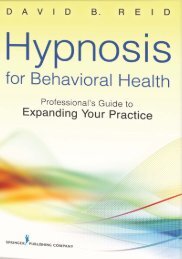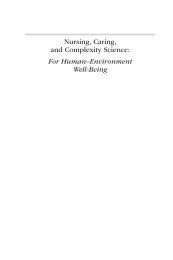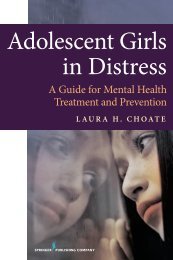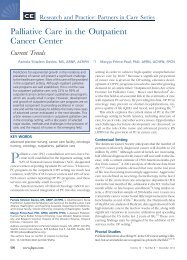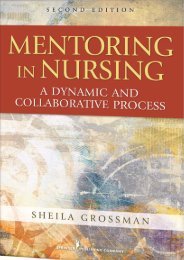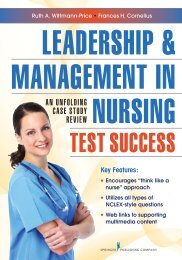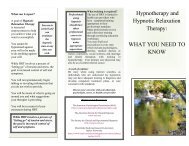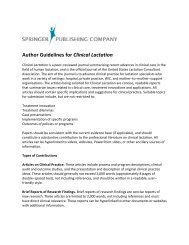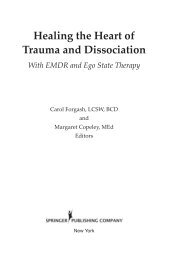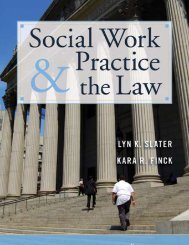Download - Springer Publishing
Download - Springer Publishing
Download - Springer Publishing
Create successful ePaper yourself
Turn your PDF publications into a flip-book with our unique Google optimized e-Paper software.
2 • CERTIFIED NURSE EDUCATOR (CNE) REVIEW MANUAL<br />
and working conditions. There is an increased demand for nurse practitioners (NPs)<br />
in response to the health care movement into the community and the concentration<br />
on health promotion and health maintenance as well as on sick-care services.<br />
According to the American Nurses Association, approximately 60% to 80%<br />
of primary and preventive care can be performed by NPs. The growing emphasis<br />
on prevention and public health will continue to create excellent job opportunities<br />
for NPs.<br />
The data from the American Academy of Colleges of Nursing (AACN) show<br />
that baccalaureate nursing programs were forced to turn away 51,082 qualified<br />
applicants in 2011 because of a shortage of clinical placement sites, educators, and<br />
funding. These numbers are likely to increase as budget cuts to state college programs<br />
focused on the sciences and health care professions continue (AACN, 2011).<br />
The burden in nursing education has also been impacted by the suggestion made<br />
by the nation’s Magnet ® -designated hospitals that 80% of the workforce have<br />
a bachelor’s degree by 2020 (AACN, 2012; Sherman, 2012). It is also suggested in<br />
the Future of Nursing report released by the Institute of Medicine (2010) that nurses<br />
achieve higher levels of education and be educated in new ways that better prepare<br />
them to meet the needs of the population.<br />
WHY BECOME A CNE?<br />
A substantial increase in student nurses is only one factor that summons the<br />
urgency for certified nurse educators. Another contributing factor, adding to the<br />
faculty shortage, is the demographics of the current teaching faculty. The average<br />
age of a master’s-prepared nurse educator is 49, whereas the average age of those<br />
holding doctorate degrees is 53. The average age of retirement for nurse educators<br />
is 62.5 years (AACN, 2012).<br />
Another factor is the nursing education transformation, which includes<br />
developing innovative methods for learner-centered academics, integrating evidence-based<br />
practice into nursing education, using information technology, and<br />
incorporating strategies to effectively assess and evaluate learners. The CNE<br />
also has an in-depth understanding of the need to balance teaching, research/<br />
scholarship, and service, which has become an expectation in nursing academia<br />
(Wittmann-Price, 2012).<br />
Many colleges and schools of nursing are recruiting expert nurse clinicians<br />
and advanced practice RNs to assist in filling their vacant academic and clinical<br />
nurse educator roles. This recruitment process has been fostered by state and foundational<br />
funds to supplement nurse educator programs<br />
on the master’s and doctoral levels.<br />
The role development that many nurse educators<br />
undergo involves a difficult process of struggling<br />
to evolve from being an expert clinician to<br />
being a novice educator. Nursing literature provides<br />
ample documentation to demonstrate that being an<br />
expert clinician does not provide an educator with<br />
the skill set needed to become a successful teacher.<br />
Through additional studies that lead to certification<br />
in nursing education, expert clinicians can become<br />
comfortable in their new role as nurse educators<br />
and build their new practice, preparing the next generation of nurses while using<br />
proven teaching and learning principles.<br />
Teaching Gem: Nurse educators<br />
should consider integrating a<br />
learning-styles inventory since it is<br />
fundamental in the development of<br />
classroom activities and will impact<br />
the outcomes of learners (Frankel,<br />
2009).<br />
© <strong>Springer</strong> <strong>Publishing</strong> Company, LLC.



